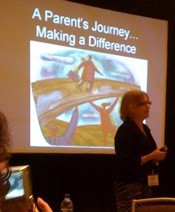We receive wonderful stories about parents who have become seasoned and powerful advocates for their children. Now these parents are paying it forward by providing advice and information to others, developing advocacy study groups, or training parents, service providers, and educators in special education advocacy.
 Special education advocate Graciela Tiscareño-Sato and her husband have compiled their knowledge of law and seven years of negotiating experience into a multimedia DVD for all parents, service providers and educators in the educational system. They attended a Wrightslaw Special Education Law Boot Camp…
Special education advocate Graciela Tiscareño-Sato and her husband have compiled their knowledge of law and seven years of negotiating experience into a multimedia DVD for all parents, service providers and educators in the educational system. They attended a Wrightslaw Special Education Law Boot Camp…
before their daughter started public preschool. They learned about:
- parental and child rights under the Individuals with Disabilities Education Act of 2004 (IDEA 2004)
- how school districts make decisions about special education programs
- the importance of positive relationships built with IEP teams
Building Bridges of Knowledge
The Satos are eight years into raising a daughter who is blind and thriving in the local public school, within the California special education system. They are determined to build bridges of knowledge between parents and educators, so that children with disabilities receive continuous educational benefit.
 Read about their training program in Just in Time for School Year: Special Education Advocate Launches Must-Have School Supply for Parents, Teachers of Children with Disabilities. http://www.prweb.com/releases/2010/07/prweb4286494.htm
Read about their training program in Just in Time for School Year: Special Education Advocate Launches Must-Have School Supply for Parents, Teachers of Children with Disabilities. http://www.prweb.com/releases/2010/07/prweb4286494.htm
Find more information about the Satos Multimedia Seminar on DVD –“You Gotta Know the Rules if You’re Going to Play the Game”
Parents Leading the Way

With so many parents leading the way, it seems a new Wrightslaw series is taking shape about the Power of Parent Advocacy.
Susan Bruce leads the way at the Region 2 PTI Conference in Memphis as she trains other parents how to “Make a Difference.”
Parent advocates learn about parental and child rights in IDEA by attending a Wrightslaw training program or using the Multimedia training series.
Read more about parent advocates who are training and enabling other parents.
Sharon Mullen and Sharon Dobkin – The Power of Parent Advocacy https://www.wrightslaw.com/blog/?p=1360
Susan Bruce – Parents Leading the Way
https://www.wrightslaw.com/blog/?p=2368
Nana Donna and Tiffany Moody – Miss Emma’s IEP Map for Success
https://www.wrightslaw.com/blog/?p=3106





It is sadly true that sometimes there is no option but to go to impartial hearing. It should always be a last resort; but it is written into the laws for a reason, so that parents do have that option.
The important point is to methodically work your way through the process before you go to hearing. It takes time, patience, self control and work to do this. MOST of the time, you will be successful at some point before hearing. IF not, you know you have done all the right things to get to a collaborative point with the district.
You will never regret taking the high road in working with the school, And allowing the district to save face, never rubbing it in if they capitulate, is a part of the collaborative process. Always be gracious in victory.
Sadly, in my district it has progressed to the point that EVERY outside evaluator that has seen my son has told me to get a lawyer. This includes some folks contracted by the District to tell us “no”. Even folks within the district have been heard to say “The parents got screwed.”
I am not sure how to advocate in that situation. It would seem that due process is the only way to go.
Sometimes, no matter how educated the parents are in Special Ed law, the school district still won’t do what’s right. We had to hire a lawyer and go to mediation. Mediation failed so we were prepared to move on to due process. Only then, when the district saw we were not giving in, did they finally agree to provide the services my son needs to access FAPE (he has PTSD/Anxiety – the invisible disability). They are even reimbursing us for our attorney fees!!
It makes sense for parents who have a child with a known disability to pave the way for a positive experience with the IEP team. However, it’s quite different when your child has an undiagnosed & less obvious disability such as Dyslexia. Unfortunately for us we spent 3 yrs trying to work cooperatively with the School & District but their policies and procedures left our child without adequate assessment & she failed to make progress. After we had had enough, we decided to educate ourselves & began advocating for a different approach. This turn of events put the District on the defense despite our attempts to work collaboratively with them. At the school site our efforts seem to be paying off & we have maintained positive relationships there but they are not the ones calling the shots. Working with administrators is challenging.